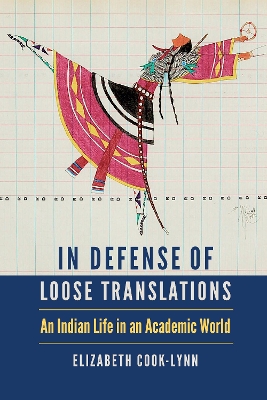American Indian Lives
1 total work
In Defense of Loose Translations is a memoir that bridges the personal and professional experiences of Elizabeth Cook-Lynn. Having spent much of her life illuminating the tragic irony of being an Indian in America, this provocative and often controversial writer narrates the story of her intellectual life in the field of American Indian studies.
Drawing on her experience as a twentieth-century child raised in a Sisseton Santee Dakota family and under the jurisdictional policies that have created significant social isolation in American Indian reservation life, Cook-Lynn tells the story of her unexpectedly privileged and almost comedic “affirmative action” rise to a professorship in a regional western university.
Cook-Lynn explores how different opportunities and setbacks helped her become a leading voice in the emergence of American Indian studies as an academic discipline. She discusses lecturing to professional audiences, activism addressing nonacademic audiences, writing and publishing, tribal-life activities, and teaching in an often hostile and, at times, corrupt milieu. Cook-Lynn frames her life’s work as the inevitable struggle between the indigene and the colonist in a global history. She has been a consistent critic of the colonization of American Indians following the treaty-signing and reservation periods of development. This memoir tells the story of how a thoughtful critic has contributed to the debate about indigenousness in academia.
Drawing on her experience as a twentieth-century child raised in a Sisseton Santee Dakota family and under the jurisdictional policies that have created significant social isolation in American Indian reservation life, Cook-Lynn tells the story of her unexpectedly privileged and almost comedic “affirmative action” rise to a professorship in a regional western university.
Cook-Lynn explores how different opportunities and setbacks helped her become a leading voice in the emergence of American Indian studies as an academic discipline. She discusses lecturing to professional audiences, activism addressing nonacademic audiences, writing and publishing, tribal-life activities, and teaching in an often hostile and, at times, corrupt milieu. Cook-Lynn frames her life’s work as the inevitable struggle between the indigene and the colonist in a global history. She has been a consistent critic of the colonization of American Indians following the treaty-signing and reservation periods of development. This memoir tells the story of how a thoughtful critic has contributed to the debate about indigenousness in academia.
